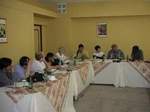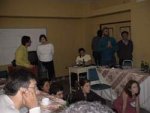

Publicado el 4 de mayo de 2005
Traducciones disponibles en:
Español (original) .
français .
Português do Brasil .
2005 Meeting of the International Charter Committee, in Chile : a first evaluation
por Carlos LIBERONA
About the STRENGTHS
![]() The meeting gives clarity on the agreements, points of possible cooperation, networks that exist and it confirms that the process has started, with different rhythms, and that it will acquire mayor force and rythmin the next two years.
The meeting gives clarity on the agreements, points of possible cooperation, networks that exist and it confirms that the process has started, with different rhythms, and that it will acquire mayor force and rythmin the next two years.
![]() The Charter already has “social nests”, that is bases of departure in several countries and the support to the Charter is growing, although our construction plan is still weak and experimental.
The Charter already has “social nests”, that is bases of departure in several countries and the support to the Charter is growing, although our construction plan is still weak and experimental.
![]() The construction of the dialogue and support is expressed in diverse sectors, especially women, academics, social world, art and culture, indigenous and youth.
The construction of the dialogue and support is expressed in diverse sectors, especially women, academics, social world, art and culture, indigenous and youth.
![]() There are a series of results or products that will facilitate the work of the next stage: videos, books, reflections, etc.
There are a series of results or products that will facilitate the work of the next stage: videos, books, reflections, etc.
![]() Allies are naturally showing out for the construction that will facilitate the work on the Charter.
Allies are naturally showing out for the construction that will facilitate the work on the Charter.
![]() There is large agreement among us, regarding the content and meaning of the Charter, except for the concern on how to ’open’ the Charter, or how to protect its essential formulation.
There is large agreement among us, regarding the content and meaning of the Charter, except for the concern on how to ’open’ the Charter, or how to protect its essential formulation.
![]() Slowly, we are building trust based links and knowledge in our team, I think this is the essential result for the future.
Slowly, we are building trust based links and knowledge in our team, I think this is the essential result for the future.
![]() We have created the conditions to intensify the cooperation and I believe that these conditions are gathered to improve communication, a vital aspect of the construction.
We have created the conditions to intensify the cooperation and I believe that these conditions are gathered to improve communication, a vital aspect of the construction.
About the WEAKNESSES
We continue aiming mostly the local construction, whiwh is only partial. We can hardly see the whole of the construction. Besides valuing the existent diversity, we should work dedicating to the common elements and the common plans.
![]() We have all chosen the social partners according to our local backgrounds and trusts, we should I believe advance to choose two or three social partners and build with them in each country (for example women, youth and culture?).
We have all chosen the social partners according to our local backgrounds and trusts, we should I believe advance to choose two or three social partners and build with them in each country (for example women, youth and culture?).
![]() We should not polarize the discussion on the construction scenarios wether in the institutions or in the social movements, we should, I believe, coordinate both scenarios.
We should not polarize the discussion on the construction scenarios wether in the institutions or in the social movements, we should, I believe, coordinate both scenarios.
![]() The biggest challenge, of course, is to pass from the local construction to the universal one, for which we should improve our communication work.
The biggest challenge, of course, is to pass from the local construction to the universal one, for which we should improve our communication work.
![]() It appears clearly that it becomes necessary to investigate more on what the diverse sectors understand on RESPONSIBILITY.
It appears clearly that it becomes necessary to investigate more on what the diverse sectors understand on RESPONSIBILITY.
Carlos Liberona, Chile,
February 12, 2005.




